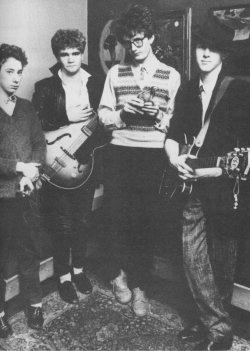Anorexic Beauty (Freaks, 1987)
Anorexic Beauty (Live, 1985, Fascinations Nitespot, Chesterfield – Video)
Anorexic Beauty (Ping Pong Jerry Demo, Nov 1984)
Anorexic Beauty at Pulpwiki
Eight unusual things about Anorexic Beauty by Pulp
1. It wasn’t originally a Pulp song. Written by David Kurley of early-Pulp contemporaries New Model Soldier, it was sold to Russell for £1 after a gig. The song dates back to an earlier David Kurley band, Blimp, who featured a young Magnus Doyle on drums. New Model Soldier were an interesting enough group in their own right – a few of their recordings can be heard here. The song was extensively re-worked by Pulp, but the lyrics survive intact.
2. Kurley’s lyrics could easily be from a post-modern treatise on desire and repulsion. I mean that in a good way – for a pop song it demonstrates an unusal level of forethought. Of course, on the other hand, we lack any insight into the author’s real feelings, but frankly, who cares? Situationist posturing about commodification, objectivisation and alienation is such a rarity in pop music. If it was presented in a po-faced manner (or used impenetrable language like “situationist posturing about commodification, objectivisation and alienation”) this might be a problem, but fortunately it’s witty, blunt and accessible enough to work.
3. Russell is singing – not a unique occurence, but he’s actually singing here rather than just making a speech with ominous backing music. In earlier versions of the song Jarvis would sing in tandem with Russell, but on the LP version his vocal has been mixed far down enough that you wouldn’t notice it unless you were really paying attention.
4. Jarvis is playing the drums, not with a great deal of precision, but considering he wasn’t a drummer the effect isn’t as bad as it might’ve been. The song doesn’t require him to do anything beyond a simple two-handed smash every second, so it probably didn’t require lessons.
5. Magnus is playing the guitar – again, not with a huge amount of finesse, but this isn’t exactly a delicate musicianly piece, and anyone who’s been in as many bands as he had would surely have picked up a few chords. Later on in the Pulp story another drummer trying out a guitar bit would create something rather special.
6. It’s not really about Lena Zavaroni. A child star of the 70s, she had her own TV variety show between 1979 and 1981. Her condition wouldn’t become public until the mid-80s, when the song was already five years old. Presumably it was dedicated to her on the sleeve of ‘Freaks’ because she was in the news at the time. In hindsight this seems rather cruel – Lena wasn’t a model, and she died in 1999 while in hospital waiting for experimental brain surgery, her last years spent on a council estate, living on state benefits.
7. Most unlikely fact of all, perhaps; this postmodern sex & death thrash somehow functions as a bit of light relief on ‘Freaks’. Reviewing the LP for Sounds magazine “Mr Spencer” remarked that “this presumably is Pulp’s idea of a ‘fun’ song.” – and while that may not strictly be the case, it’s certainly a lot more enjoyable to listen to than “Life Must Be So Wonderful” or “The Never-Ending Story.”
8. In the quarter-century since the song was recorded, it seems to have become popular with the online ‘pro-ana’ crowd. See this video, this website or this one or this one. On each (particularly the video) there is a debate raging over whether the song is a celebration of anorexia or a condemnation of it. In truth the lyrics don’t engage with this debate in either direction – David Kurley’s interest being more in performance art and philosophy than actually writing about an ‘issue’ – but it’s fascinating to find out how complex and multidimensional the disease is in the minds of sufferers, and how many of them are willing to use dark humour to discuss it.




